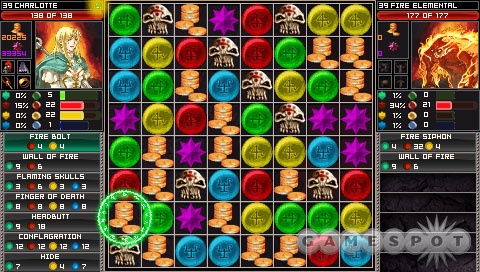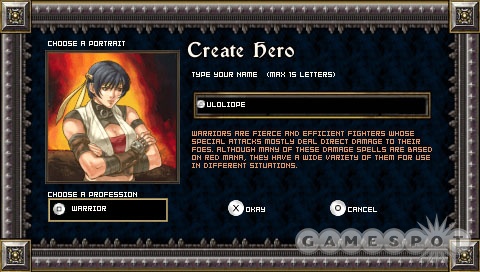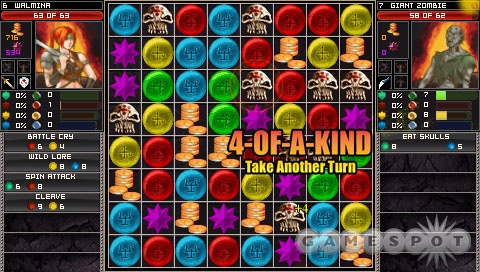Puzzle Quest: Challenge of the Warlords Hands-On
One part puzzle game, one part RPG; we check out this interesting hybrid handheld game.
What's the one thing missing from gem puzzle games like Bejeweled? If your answer was "role-playing elements" and "face-to-face combat," then Puzzle Quest: Challenge of the Warlords is the game you've been waiting for. We had a chance to try out this interesting spin on the traditional puzzle format during a recent D3 press event, and we like what we've seen of the game so far.

The easiest way to imagine Puzzle Quest is as a mix of the challenging Bejeweled-like puzzles mixed with role-playing elements that would fit nicely in an older Final Fantasy game. You start off the game by creating a character of your own and assigning him or her a name and picture as well as a character class, which is an essential aspect of the game's approach. There are four classes in the game: knight, warrior, wizard, and druid--and, as you might expect, each class has its own set of strengths and weaknesses. Warriors and knights like to get up-close and personal when fighting monsters, while wizards and druids prefer to cast spells from afar.
"Wait a minute," you might be saying. "Monsters and spellcasting in a puzzle game?" Yeah--honestly, we weren't sold at first, either. It's only after you sit down and give the game a few minutes that you realize just how compelling the formula can be. The game has three main modes of play: instant action, which lets you go up against a randomly generated monster; multiplayer, which has you battle it out against a friend via the wireless connection on the PlayStation Portable or DS; and the game's involved quest mode, in which you take your created character on a quest to stop an evil warlord from conquering the land, all the while puzzle-battling your way through hordes of enemies.
You'll see the puzzles most often in the game's frequent combat sequences, and Bejeweled vets will likely feel at home right away. Here's how it works: The puzzle grid is made up of eight columns and eight rows; when the game begins, the grid is filled with a variety of different-colored icons. Most of the icons are gems, and their color corresponds to a type of mana (red: fire, blue: water, yellow: air, green: earth). Other icons represent extra experience and gold pieces, as well as numerous skulls--but we'll get to those in a bit.
The goal in the puzzle portions in Puzzle Quest is to eliminate gems by lining up any three similar icons either vertically or horizontally; new gems then drop down to replace the eliminated gems. If you eliminate mana gems, you earn the appropriate kind of mana based on the color gem you eliminated. So, if you cancel three yellow gems, you'll earn three points of air mana. Similarly, by lining up three gold-piece icons, you'll earn cash for your character, which you can later spend on weapons and armor. Should you manage to line up four or more icons at once, you'll not only enjoy the greater mana boost, but you'll also earn a second turn on the grid.

However, because Puzzle Quest is at its heart a combat game, things get interesting when you tie in the skull icons. Lining up three or more skulls in a row subtracts hit points from your opponent, and the ultimate goal is to reduce your foe to zero life. Later in a match, skulls appear with larger damage modifiers, giving you that much more incentive to position them in your favor. Then there are the spells. Remember all that mana you're building up as you eliminate gems from the grid? Once you've built up enough mana, you can cast a spell from your arsenal against your opponent. Spells range from the simple, such as doing a set amount of damage to your opponent, to the more complex, such as eliminating all the experience icons on the grid at once, or causing your opponent to lose a turn.
How you design your character's abilities, then, will have a big impact on how you play Puzzle Quest. At the end of every match, you'll receive experience and gold, and if you level up, you can allocate upgrade points to many of the attributes for your character. How you allocate those points will go a long way to determining your success on the puzzle grid. Doling out points for red fire mana attribute, for example, will give you a bonus when eliminating fire gems on the grid; so if you want to focus on your fire-based spells, this is not a bad approach.
One of the nicest things about the game was how much strategy was involved in the combat. Because you can make only one move per turn (unless, of course, you use a spell modifier to grant you extra turns) and can move only one gem per turn (by pressing the X button and then the directional pad in the direction you wish to move the gem), you need to weigh your options carefully. Do you take the easy mana bonus so you can cast a huge spell in the next turn? Or do you screw your opponent out of the crucial blue mana he needs to cast his big spell on you? The possibilities are huge, varied, and make for a lot of fun, especially when playing in multiplayer.

That said, Puzzle Quest's single-player game will have plenty to do as well. With more than 40 hours of gameplay (including more than 100 quests to take part in) you won't be lacking for things to accomplish in the game. The quest mode looks and feels like a very traditional RPG, with enemies to encounter and a world map and dungeons to explore. There will also be friendly cities to visit where you can buy new items for your character, such as armor, weapons, and accessories, all of which will give you combat bonuses of one sort or another. There are other nice RPG touches: Instead of fighting enemies, you can attempt to capture them; succeed and you can take them with you and eventually siphon all the spells they know into your own personal spell book. You can also forge new items with various elements you collect throughout the game, and interestingly, your success in forging will once again depend on your skills at the puzzle mode. We also really like the fact that you can use a single character in any mode you play in, be it single-player, multiplayer, or quest, and continually improve him or her as you go.
There's no denying that the folks behind Puzzle Quest are trying something new with the tried-and-true puzzle game. What remains to be seen is if the puzzle mechanics at the core of the game will hold up and remain interesting in a game that looks as though it will take a good, long time to complete. We'll know in March, when it ships on the PSP and DS, so expect our full review then.
Got a news tip or want to contact us directly? Email news@gamespot.com
Join the conversation